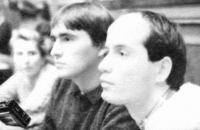We live in a relatively decent society, however, at the same time we still feel, the Velvet Revolution needs to be accomplished
Daniel Bútora was born in 1967 in Bratislava. Before 1989, his father Martin Bútora worked in the sphere of independent sociologists criticizing the communist regime. His mother was the daughter of the communist poet Ladislav Novomeský. When he was eighteen, he was baptized and he often attended secret meetings and holy masses in private flats. After graduation, he worked as a stage crew for one year and then he started to study library and information science at the Faculty of Arts of the Comenius University. He was intensively interested in Easter Europe events after Mikhail Gorbachev became the head of the Soviet Union. He took part in meetings of different anti-regime organizations, which intermixed by the end of the 1980s. Thanks to his father, Daniel got to know Slovak dissidents. On November 13, 1989, he joined the demonstration for the liberation of the so-called Bratislava Five in front of the Palace of Justice in Bratislava. Following the events that happened on November 17 in Prague, Daniel was one of the students who led discussions with the Faculty representatives on November 20, in the auditorium of Faculty of Arts of the Comenius University. He was also very active in forming the students’ movement. As one of the student leaders, he cooperated with the VPN (Public Against Violence) on organizing protest demonstrations. In 1990 he stopped his uncompleted study, devoted himself to journalism and worked in VPN. After Vladimír Mečiar’s victory in elections of June 1992, he bowed out of politics. He moved to Prague, where he worked for the Radio Free Europe and he graduated from the Charles University. Since 2004 he lives in Bratislava, works as a coach of top managers, and is engaged in work with children and youth.
